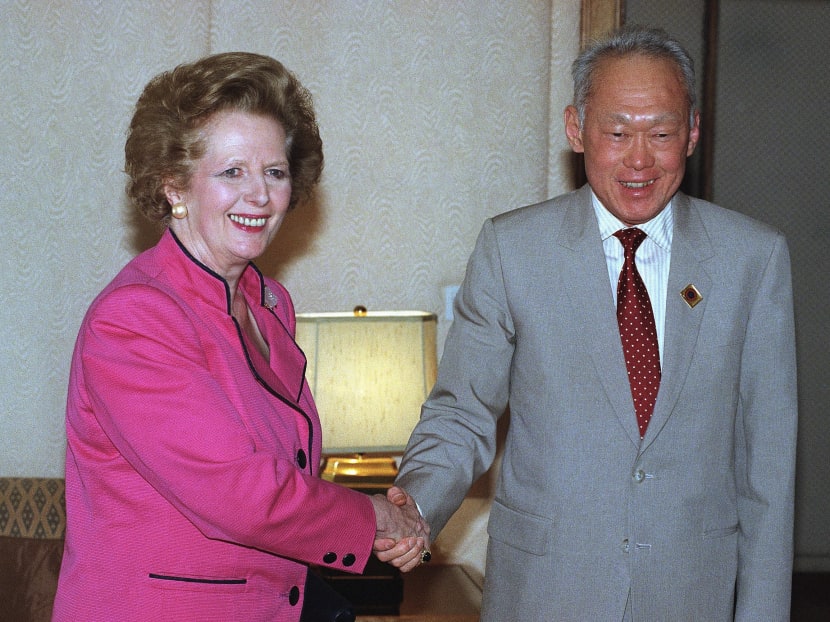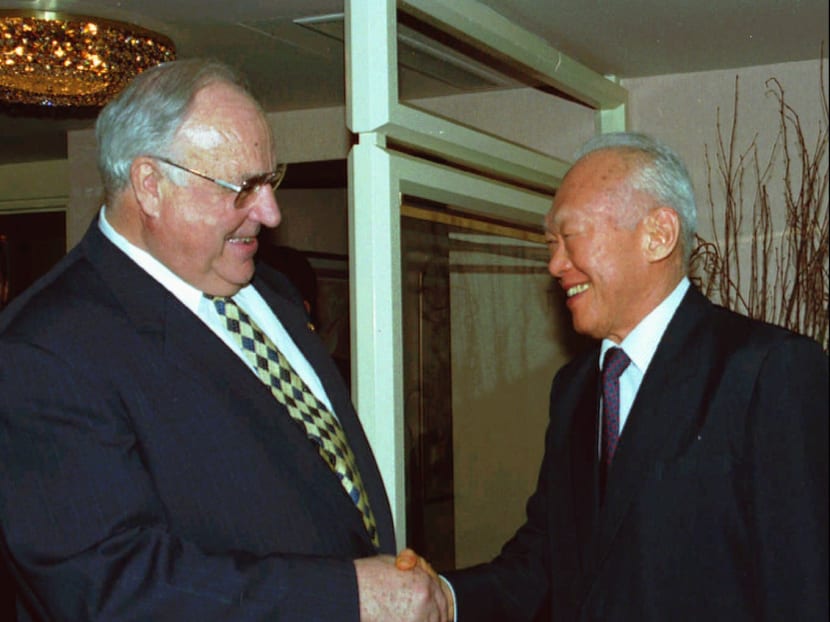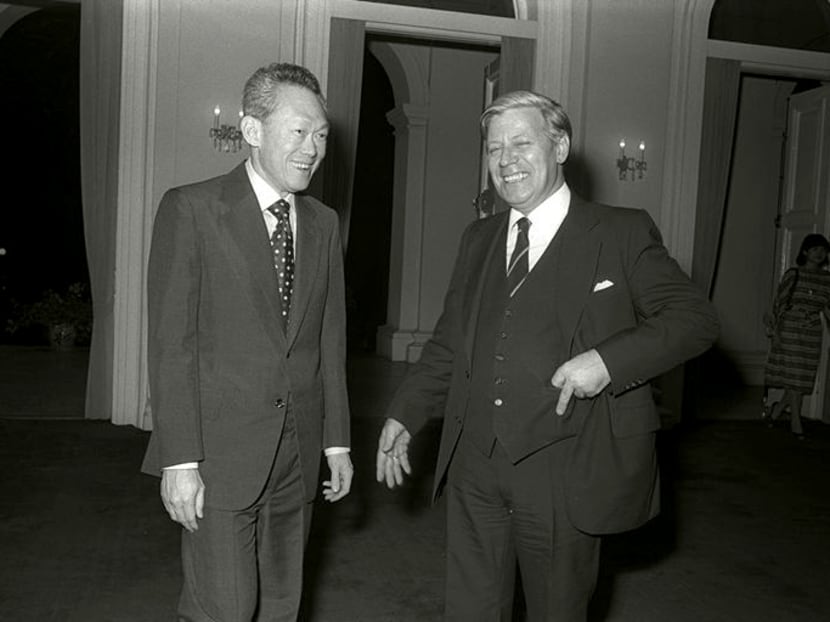For Mr Lee Kuan Yew, Europe’s prospects were dim
Mr Lee Kuan Yew emerged as a nationalist in the wider, post-World War II movement against European colonialism. Yet, he was not inclined to take a dim view of colonialism, seeing British rule as part of Singapore’s history.



Mr Lee Kuan Yew emerged as a nationalist in the wider, post-World War II movement against European colonialism. Yet, he was not inclined to take a dim view of colonialism, seeing British rule as part of Singapore’s history.
In fact, in his interview in One Man’s View Of The World, he said he was grateful for the institutions that the British left behind.
He developed close ties with European leaders of his period. Mr Helmut Schmidt and Mr Helmut Kohl of Germany were his friends, though they came from different sides of their country’s political divide. There was also the late British Prime Minister Margaret Thatcher, whose relationship with Mr Lee could be said to be one of mutual admiration.
Mr Lee’s views on Europe are less known than his opinions on the United States and China, and these may have been very much coloured by his association with Britain and Thatcher.
LEE AND THATCHER
On a personal level, Mr Lee and Mrs Thatcher were kindred spirits, sharing perhaps “ideological convergence” on many issues relating to government and economy.
Both believed in the importance of hard work and enterprise. Singapore under Mr Lee eschewed social welfarism, seeing it as a system that saps the work ethic of people on welfare.
Hence, he was all praise for Mrs Thatcher for trimming the excesses of the welfare state in Britain during her years in Downing Street. He also praised her for taking on and taming the trade unions, and for privatising major sectors of the British economy to give it renewed vitality.
Mrs Thatcher was also an admirer of Singapore’s success under Mr Lee. She once said: “Singapore, when Harry Lee took over, was comparatively small, could never have sustained the number of people it has now in prosperity unless he ran the economy and politics which he does; which is an enterprise economy with incentives, lower taxation and not one that is nationalised from top to bottom.”
Mr Lee’s views on global developments and events, and particularly on China, were sought after. Mrs Thatcher said: “In office, I read and analysed every speech of Harry’s. He had a way of penetrating the fog of propaganda and expressing with unique clarity the issues of our time and the way to tackle them. He was never wrong …”
She was known to have asked for Mr Lee’s advice when Britain was negotiating with China on the handover of Hong Kong.
This ideological convergence between Mrs Thatcher and Mr Lee might have accounted somewhat for his less sanguine view on Europe and European integration.
In his book From Third World To First, Mr Lee wrote that his views on the Europeans had been much influenced by British attitudes of the 1950s and 1960s.
He saw rightly then that Britain’s motivation to join the European Economic Community (EEC) was “to get out of its recurring economic difficulty of slow growth”, compared with the EEC member states, and hoped that the larger market would spur growth.
LEE, GERMAN LEADERS AND EU
In contrast, Mr Lee noted in From Third World To First that in his interactions with former German Chancellor Kohl, the latter’s “single-minded pursuit of the Economic and Monetary Union (EMU)” was related to the issue of war and peace, and that Mr Kohl believed the euro would make the process of European integration irreversible. He lauded Mr Kohl as a “great German who reunified Germany and as a greater European who wanted Germany as part of a supranational Europe to avoid the disastrous European wars of the last century”.
Mr Lee’s astute observations about Britain’s motivations for joining the European Union and Germany’s commitment to European integration as a project of peace can help inform us about the current debates on the eurozone crisis and where the EU is heading.
The United Kingdom wants an EU that is more focused on the economic aspect of the single market and not one with a grand political vision. That was the reason behind British Prime Minister David Cameron’s demand to renegotiate parts of the UK’s relations with the EU and to “claw back” some of the power given to the EU. The British vision of the EU is one of flexibility and cooperation, and not the same as those “who want to build an ever-closer political union”.
In contrast, German leaders want Germany to remain at the heart of the EU and believe that deeper integration is inevitable if the EU is to emerge from the debt crisis stronger.
However, Mr Lee was pessimistic about the euro and the EU when he was interviewed for One Man’s View Of The World. He believed that without real fiscal integration, the euro in its current form is doomed, and that without deeper integration into a sort of United States of Europe, “Europe will be reduced to the role of supporting actor”.
While it was clear to him that the best course for the EU was to integrate further, he also noted that it was going to be difficult, almost impossible even. Countries in Europe are too caught up in its past and history. The EU has also grown too large and disparate to be able to reach a consensus on the future.
Yet, Mr Lee was quick to add in the interview that he wrote “more in sorrow than in derision about Europe’s inevitable decline”. He was not against the EU. Indeed, even when he was discussing Singapore in The New York Times in 2007, he was of the view that “if we were Malta, we would have joined the EU”.
Mr Lee believed that “integration holds great promise apart from just peace” and concluded that if the Europeans were to deepen their integration efforts, they “would have much greater economic clout” and “a much bigger voice in international affairs”.
Yeo Lay Hwee is director of EU Centre and council secretary and senior research fellow of the Singapore Institute of International Affairs (SIIA). Simon Tay is chairman of the SIIA and the author of Asia Alone: The Dangerous Post-Crisis Divide From America.






